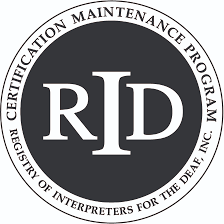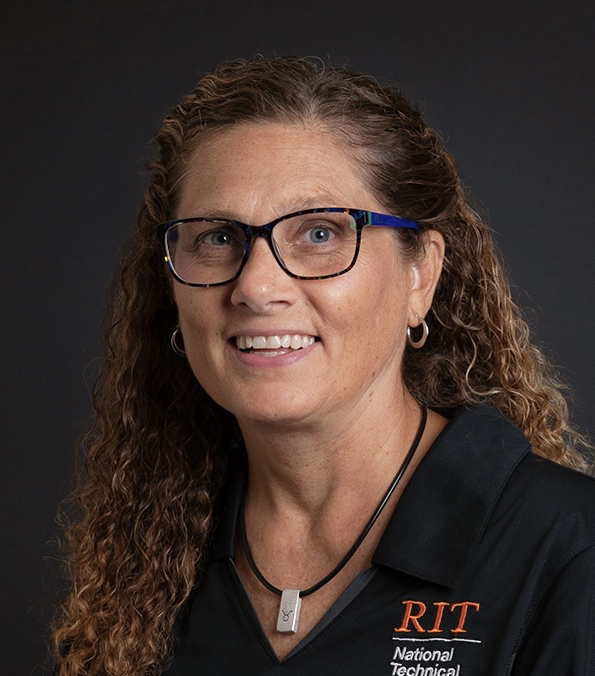Certificate in Deaf Interpreting (Non-Credit)


Department of ASLIE
Certificate in Deaf Interpreting
- RIT/
- ASLIE
Overview
The Certificate in Deaf Interpreting (CIDI) at Rochester Institute of Technology’s National Technical Institute for the Deaf (RIT/NTID) is a unique program designed to prepare participants to work as Deaf interpreters in a variety of settings. By focusing on the distinct needs and strengths of Deaf interpreters, the CIDI program aims to bridge communication gaps and expand accessibility for diverse communities.
Participants in the CIDI program benefit from a curriculum that combines technical training with real-world application. This program provides individuals who aspire to become Deaf interpreters with essential skills that significantly advance their expertise and effectiveness in the field. Participants not only develop interpreting skills but also expand their career opportunities, as the certificate aids in preparation to qualify them for employment in this specialized profession. One of the program's distinguishing qualities is its commitment to hands-on, immersive experiences facilitated by expert instructors who are well-known in the field. With specialized training in areas like Deaf-Blind and Pro-Tactile interpreting, the CIDI program stands out as a leader in preparing Deaf professionals to meet diverse communication needs. The emphasis on practical, hands-on experience, along with instruction across many settings, prepares CIDI participants to make a real difference in their communities by helping to improve communication access and inclusion for all.
RIT/NTID’s CIDI program is a powerful platform for Deaf interpreters to excel and lead in making a difference across various interpreting contexts. Upon completion, students will be awarded a Certificate of Completion in the Certificate in Deaf Interpreting program from the National Technical Institute for the Deaf.
 |
 |
ASLIE is an Approved RID CMP Sponsor for continuing education activities. The Certificate in Deaf Interpreting is a Professional Studies (PS) program offering up to 12.0 CEUs at the Some Content Knowledge Level. (The certificate program also includes instructional material which counts toward RID CMP’s Power, Privilege, and Oppression requirement.)
Goals
The Certificate in Deaf Interpreting (CIDI) program is dedicated to developing skilled, culturally competent, and ethical Deaf interpreters able to work across diverse professional settings. By focusing on hands-on training, the program enhances interpreting skills and expands participants’ knowledge in a variety of discourses such as international sign, Deafblind, medical, healthcare, legal, and educational interpreting. Alongside technical training, the program emphasizes cultural competence, helping Deaf interpreters navigate various settings with empathy and understanding, and ethical practice, guiding participants to make responsible decisions that uphold the integrity of their work.
Outcomes
After completing this program, the student will:
- Demonstrate an understanding of foundations for effective English-to-ASL and ASL-to-English translations
- Explain the roles and functions of a Deaf interpreter
- Demonstrate the ability to interpret in different discourses (e.g., medical, mental health, legal, business, DeafBlind, education, and press conferences)
- Demonstrate the use of interlingual and intralingual linguistic features (e.g., depiction, constructed action, use of visual-spatial congruence, register, non-manual signals [including mouth morphemes and affect markers]), international sign, and extralinguistic knowledge in deaf interpretation
- Apply knowledge of Deaf, DeafBlind, and other cultures to deaf interpretation
- Mock team interpretation with a hearing interpreter
- Apply professional and ethical behavior in alignment with the National Association of the Deaf-Registry of Interpreters for the Deaf Code of Professional Conduct, and the Board for Evaluation of Interpreters
Format
The program includes approximately 120 hours of instruction using an online blended format. Students meet twice weekly in Zoom from 7 – 9 PM (Eastern) on Monday and Wednesday evenings.
Class assignments include readings, reviewing PowerPoint Presentations, and watching videos. Students should plan on scheduling an average of five to seven hours per week for successful engagement in this program.
The 20-week program is offered in two different sessions:
- Fall Session: August to December
- Spring Session: January to May
Curriculum
- Module 1: Propaedeutic/Introduction Module (1 week)
- Module 2: Interpreting Theory (1 week)
- Module 3: Team, Deafblind, and Pro-Tactile Interpreting (required 20 hour on-campus training)
- Module 4: Classifiers/Depiction/Non-Manual Markers (2 weeks)
- Module 5: Sight Interpreting, Consecutive Interpreting, and Simultaneous Interpreting (2 weeks)
- Module 6: Ethics and Professional Conduct (2 weeks)
- Module 7: English-to-ASL and ASL-to-English Translation (2 weeks)
- Module 8: International Sign and Interpreting in International Settings (2 weeks)
- Module 9: Interpretation in Different Discourses (4 weeks)
- Module 10: Internship: Observation and Practice Interpreting (2 weeks)
Admission Criteria
The following criteria will be used to select applicants to participate in this program:
- Applicants must be Deaf and proficient in ASL.
- Applicants must submit a two-minute YouTube video with their application explaining who they are and why they want to become a Deaf Interpreter
- Applicants must agree to complete the entire program. (No refunds will be given.)
Apply Online
You may use the online application form to apply for the NTID Certificate in Deaf Interpreting program.
The online application deadline is March 31 for the fall session and August 31 for the spring session. Applicants will receive an email with a decision on their application status by the last week of April for the fall session and by the last week of September for the spring session.
Equipment Needed
The following information explains the technical requirements for successful participation in NTID’s online, non-credit Certificate programs. It details the hardware and software requirements as well as the system requirements and Internet speed needed to engage with online classes successfully.
For an optimal learning experience in our online Certificate programs, students are required to have access to a working device that is less than 5 years old. The recommended devices are listed below:
- Desktop Computers with a built-in webcam or an external camera
- Laptops/MacBooks with a built-in webcam or an external camera
- Minimum of two monitors (strongly recommended for synchronous online courses)
Note: Chromebooks are not recommended for these programs due to potential compatibility issues with software and platforms like Zoom.
For the best experience with navigation, performance, accessibility, and compatibility on myCourses, it is required that all students use the latest version of a supported browser. The following browsers for the best use of myCourses are:
- Google Chrome (preferred) is highly recommended for its speed, performance, and compatibility with myCourses and GoReact.
- Firefox is another reliable option that you can use for myCourses.
- Microsoft Edge also works well with myCourses but it must be upgraded to the latest version.
Note: For Mac users, Safari browser is not recommended to use for MyCourses as it’s known to run into some functionality issues with MyCourses.
Your device must satisfy the minimum system requirements to ensure a successful online learning experience.
- Memory (RAM): Your computer must have at least 4 GB of RAM. However, 8 GB is highly recommended to ensure you can access all of the course materials, software, and resources faster, including video assignments without slowdowns.
- Operating System: The most recent versions of operating systems such as Windows 10 or 11, and Mac OS X (10.15 or above). Please note that Windows 10/11 S Mode is not supported.
- System Update: Your operating system must have the most recently released updates. These updates often resolve issues with web browsers and improve performances for software such as Zoom, MyCourses, and Microsoft Office.
A reliable high-speed internet connection with speeds of 20 Mbps or higher is recommended for online courses. This ensures smooth Zoom meetings, and quick access to all course materials, including video presentations. You can check your internet speed by going to www.speedtest.net or www.fast.com.
Coordinator and Instructor
Alisha Bronk, M.A.
aabnss@rit.edu
 Alisha Bronk has worked as a Deaf interpreter for more than 30 years. She earned a bachelor’s degree in psychology in 1990 from Gallaudet University and a master’s degree in applied linguistics from Portland State University in 2009. Alisha has taught Deaf Interpreting courses at Gallaudet University and offered numerous workshops through NTID and Interpretek.
Alisha Bronk has worked as a Deaf interpreter for more than 30 years. She earned a bachelor’s degree in psychology in 1990 from Gallaudet University and a master’s degree in applied linguistics from Portland State University in 2009. Alisha has taught Deaf Interpreting courses at Gallaudet University and offered numerous workshops through NTID and Interpretek.
Alisha serves as a full-time faculty member at RIT/NTID in the department of ASL and Interpreting Education. She teaches American Sign Language and interpreting courses in the bachelor’s degree program as well as courses in the CIDI program.
Contact
Please direct questions to cidi@rit.edu.



